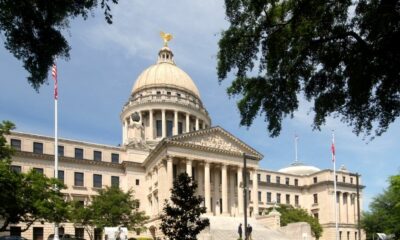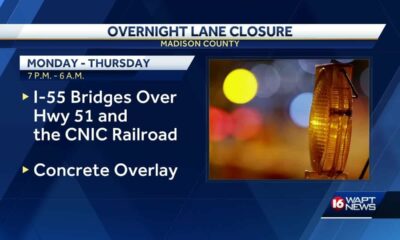Mississippi Today
Medical residents are increasingly avoiding states with abortion restrictions
Isabella Rosario Blum was wrapping up medical school and considering residency programs to become a family practice physician when she got some frank advice: If she wanted to be trained to provide abortions, she shouldn't stay in Arizona.
Blum turned to programs mostly in states where abortion access — and, by extension, abortion training — is likely to remain protected, like California, Colorado, and New Mexico. Arizona has enacted a law banning most abortions after 15 weeks.
“I would really like to have all the training possible,” she said, “so of course that would have still been a limitation.”
In June, she will start her residency at Swedish Cherry Hill hospital in Seattle.
According to new statistics from the Association of American Medical Colleges, for the second year in a row, students graduating from U.S. medical schools were less likely to apply this year for residency positions in states with abortion bans and other significant abortion restrictions.
Since the Supreme Court in 2022 overturned the constitutional right to an abortion, state fights over abortion access have created plenty of uncertainty for pregnant patients and their doctors. But that uncertainty has also bled into the world of medical education, forcing some new doctors to factor state abortion laws into their decisions about where to begin their careers.
Fourteen states, primarily in the Midwest and South, have banned nearly all abortions. The new analysis by the AAMC — a preliminary copy of which was exclusively reviewed by KFF Health News before its public release — found that the number of applicants to residency programs in states with near-total abortion bans declined by 4.2%, compared with a 0.6% drop in states where abortion remains legal.
Notably, the AAMC's findings illuminate the broader problems abortion bans can create for a state's medical community, particularly in an era of provider shortages: The organization tracked a larger decrease in interest in residencies in states with abortion restrictions not only among those in specialties most likely to treat pregnant patients, like OB-GYNs and emergency room doctors, but also among aspiring doctors in other specialties.
“It should be concerning for states with severe restrictions on reproductive rights that so many new physicians — across specialties — are choosing to apply to other states for training instead,” wrote Atul Grover, executive director of the AAMC's Research and Action Institute.
The AAMC analysis found the number of applicants to OB-GYN residency programs in abortion ban states dropped by 6.7%, compared with a 0.4% increase in states where abortion remains legal. For internal medicine, the drop observed in abortion ban states was over five times as much as in states where abortion is legal.
In its analysis, the AAMC said an ongoing decline in interest in ban states among new doctors ultimately “may negatively affect access to care in those states.”
Jack Resneck Jr., immediate past president of the American Medical Association, said the data demonstrates yet another consequence of the post-Roe v. Wade era.
The AAMC analysis notes that even in states with abortion bans, residency programs are filling their positions — mostly because there are more graduating medical students in the U.S. and abroad than there are residency slots.
Still, Resneck said, “we're extraordinarily worried.” For example, physicians without adequate abortion training may not be able to manage miscarriages, ectopic pregnancies, or potential complications such as infection or hemorrhaging that could stem from pregnancy loss.
Those who work with students and residents say their observations support the AAMC's findings. “People don't want to go to a place where evidence-based practice and human rights in general are curtailed,” said Beverly Gray, an associate professor of obstetrics and gynecology at Duke University School of Medicine.
Abortion in North Carolina is banned in nearly all cases after 12 weeks. Women who experience unexpected complications or discover their baby has potentially fatal birth defects later in pregnancy may not be able to receive care there.
Gray said she worries that even though Duke is a highly sought training destination for medical residents, the abortion ban “impacts whether we have the best and brightest coming to North Carolina.”
Rohini Kousalya Siva will start her obstetrics and gynecology residency at MedStar Washington Hospital Center in Washington, D.C., this year. She said she did not consider programs in states that have banned or severely restricted abortion, applying instead to programs in Maryland, New Hampshire, New York, and Washington, D.C.
“We're physicians,” said Kousalya Siva, who attended medical school in Virginia and was previously president of the American Medical Student Association. “We're supposed to be giving the best evidence-based care to our patients, and we can't do that if we haven't been given abortion training.”
Another consideration: Most graduating medical students are in their 20s, “the age when people are starting to think about putting down roots and starting families,” said Gray, who added that she is noticing many more students ask about politics during their residency interviews.
And because most young doctors make their careers in the state where they do their residencies, “people don't feel safe potentially having their own pregnancies living in those states” with severe restrictions, said Debra Stulberg, chair of the Department of Family Medicine at the University of Chicago.
Stulberg and others worry that this self-selection away from states with abortion restrictions will exacerbate the shortages of physicians in rural and underserved areas.
“The geographic misalignment between where the needs are and where people are choosing to go is really problematic,” she said. “We don't need people further concentrating in urban areas where there's already good access.”
After attending medical school in Tennessee, which has adopted one of the most sweeping abortion bans in the nation, Hannah Light-Olson will start her OB-GYN residency at the University of California-San Francisco this summer.
It was not an easy decision, she said. “I feel some guilt and sadness leaving a situation where I feel like I could be of some help,” she said. “I feel deeply indebted to the program that trained me, and to the patients of Tennessee.”
Light-Olson said some of her fellow students applied to programs in abortion ban states “because they think we need pro-choice providers in restrictive states now more than ever.” In fact, she said, she also applied to programs in ban states when she was confident the program had a way to provide abortion training.
“I felt like there was no perfect, 100% guarantee; we've seen how fast things can change,” she said. “I don't feel particularly confident that California and New York aren't going to be under threat, too.”
As a condition of a scholarship she received for medical school, Blum said, she will have to return to Arizona to practice, and it is unclear what abortion access will look like then. But she is worried about long-term impacts.
“Residents, if they can't get the training in the state, then they're probably less likely to settle down and work in the state as well,” she said.
KFF Health News is a national newsroom that produces in-depth journalism about health issues and is one of the core operating programs at KFF—an independent source of health policy research, polling, and journalism. Learn more about KFF.
This article first appeared on Mississippi Today and is republished here under a Creative Commons license.
Mississippi Today
2024 Mississippi legislative session not good for private school voucher supporters
Despite a recent Mississippi Supreme Court ruling allowing $10 million in public money to be spent on private schools, 2024 has not been a good year for those supporting school vouchers.
School-choice supporters were hopeful during the 2024 legislative session, with new House Speaker Jason White at times indicating support for vouchers.
But the Legislature, which recently completed its session, did not pass any new voucher bills. In fact, it placed tighter restrictions on some of the limited laws the state has in place allowing public money to be spent on private schools.
Notably, the Legislature passed a bill that provides significantly more oversight of a program that provides a limited number of scholarships or vouchers for special-needs children to attend private schools.
Going forward, thanks to the new law, to receive the vouchers a parent must certify that their child will be attending a private school that offers the special needs educational services that will help the child. And the school must report information on the academic progress of the child receiving the funds.
Also, efforts to expand another state program that provides tax credits for the benefit of private schools was defeated. Legislation that would have expanded the tax credits offered by the Children's Promise Act from $8 million a year to $24 million to benefit private schools was defeated. Private schools are supposed to educate low income students and students with special needs to receive the benefit of the tax credits. The legislation expanding the Children's Promise Act was defeated after it was reported that no state agency knew how many students who fit into the categories of poverty and other specific needs were being educated in the schools receiving funds through the tax credits.
Interestingly, the Legislature did not expand the Children's Promise Act but also did not place more oversight on the private schools receiving the tax credit funds.
The bright spot for those supporting vouchers was the early May state Supreme Court ruling. But, in reality, the Supreme Court ruling was not as good for supporters of vouchers as it might appear on the surface.
The Supreme Court did not say in the ruling whether school vouchers are constitutional. Instead, the state's highest court ruled that the group that brought the lawsuit – Parents for Public Schools – did not have standing to pursue the legal action.
The Supreme Court justices did not give any indication that they were ready to say they were going to ignore the Mississippi Constitution's plain language that prohibits public funds from being provided “to any school that at the time of receiving such appropriation is not conducted as a free school.”
In addition to finding Parents for Public Schools did not have standing to bring the lawsuit, the court said another key reason for its ruling was the fact that the funds the private schools were receiving were federal, not state funds. The public funds at the center of the lawsuit were federal COVID-19 relief dollars.
Right or wrong, The court appeared to make a distinction between federal money and state general funds. And in reality, the circumstances are unique in that seldom does the state receive federal money with so few strings attached that it can be awarded to private schools.
The majority opinion written by Northern District Supreme Justice Robert Chamberlin and joined by six justices states, “These specific federal funds were never earmarked by either the federal government or the state for educational purposes, have not been commingled with state education funds, are not for educational purposes and therefore cannot be said to have harmed PPS (Parents for Public Schools) by taking finite government educational funding away from public schools.”
And Southern District Supreme Court Justice Dawn Beam, who joined the majority opinion, wrote separately “ to reiterate that we are not ruling on state funds but American Rescue Plan Act (ARPA) funds … The ARPA funds were given to the state to be used in four possible ways, three of which were directly related to the COVID -19 health emergency and one of which was to make necessary investments in water, sewer or broadband infrastructure.”
Granted, many public school advocates lamented the decision, pointing out that federal funds are indeed public or taxpayer money and those federal funds could have been used to help struggling public schools.
Two justices – James Kitchens and Leslie King, both of the Central District, agreed with that argument.
But, importantly, a decidedly conservative-leaning Mississippi Supreme Court stopped far short – at least for the time being – of circumventing state constitutional language that plainly states that public funds are not to go to private schools.
And a decidedly conservative Mississippi Legislature chose not to expand voucher programs during the 2024 session.
This article first appeared on Mississippi Today and is republished here under a Creative Commons license.
Mississippi Today
On this day in 1925


MAY 19, 1925

Malcolm X was born Malcolm Little in Omaha, Nebraska. When he was 14, a teacher asked him what he wanted to be when he grew up and he answered that he wanted to be a lawyer. The teacher chided him, urging him to be realistic. “Why don't you plan on carpentry?”
In prison, he became a follower of Nation of Islam leader Elijah Muhammad. In his speeches, Malcolm X warned Black Americans against self-loathing: “Who taught you to hate the texture of your hair? Who taught you to hate the color of your skin? Who taught you to hate the shape of your nose and the shape of your lips? Who taught you to hate yourself from the top of your head to the soles of your feet? Who taught you to hate your own kind?”
Prior to a 1964 pilgrimage to Mecca, he split with Elijah Muhammad. As a result of that trip, Malcolm X began to accept followers of all races. In 1965, he was assassinated. Denzel Washington was nominated for an Oscar for his portrayal of the civil rights leader in Spike Lee's 1992 award-winning film.
This article first appeared on Mississippi Today and is republished here under a Creative Commons license.
Did you miss our previous article…
https://www.biloxinewsevents.com/?p=359877
Mississippi Today
On this day in 1896


MAY 18, 1896

The U.S. Supreme Court ruled 7-1 in Plessy v. Ferguson that racial segregation on railroads or similar public places was constitutional, forging the “separate but equal” doctrine that remained in place until 1954.
In his dissent that would foreshadow the ruling six decades later in Brown v. Board of Education, Justice John Marshall Harlan wrote that “separate but equal” rail cars were aimed at discriminating against Black Americans.
“In the view of the Constitution, in the eye of the law, there is in this country no superior, dominant, ruling class of citizens,” he wrote. “Our Constitution in color-blind and neither knows nor tolerates classes among citizens. In respect of civil rights, all citizens are equal before the law. The humblest is the peer of the most powerful. The law … takes no account of his surroundings or of his color when his civil rights as guaranteed by the supreme law of the land are involved.”
This article first appeared on Mississippi Today and is republished here under a Creative Commons license.
Did you miss our previous article…
https://www.biloxinewsevents.com/?p=359301
-
Our Mississippi Home6 days ago
Beat the Heat with Mississippi’s Best Waterparks
-
SuperTalk FM3 days ago
State auditor cracking down on Mississippians receiving unemployment benefits
-
Our Mississippi Home7 days ago
Charlie’s U-Pik: Opening Soon for the Summer Season
-
Mississippi News Video5 days ago
Jackson has a gang problem
-
Kaiser Health News6 days ago
Medicaid ‘Unwinding’ Decried as Biased Against Disabled People
-
Local News2 days ago
Family files lawsuit after teen’s suicide in Harrison County Jail
-
Mississippi Today4 days ago
On this day in 1950
-
228Sports5 days ago
George County Pours Runs In 6A South State Title Victory At PRC






































